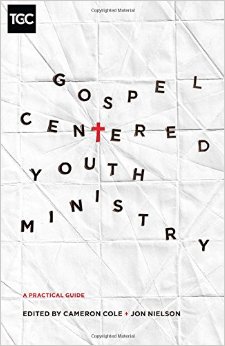As youth workers, it’s essential to remember every student has a family he or she returns to when leaving youth group.
We can talk about how we view ourselves as a support to the family, but too often we are guilty of paying only lip service to this notion. Ministry to parents must be more than a good idea.

In Deuteronomy 6, Moses wanted to ensure that the coming generations would remember their history and remain faithul. In the midst of God’s deliverance of Israel, it defies comprehension that parents would neglect teaching their children who the Lord was and what he had done for them.
And yet, just two generations after leaving Egypt there “arose another generation after [Joshua’s] who did not know the LORD or the work that he had done for Israel” (Judges 2:10).
This command to parents in Deuteronomy 6 was set within the broader context of renewing Israel’s covenant with God, and followed the rehearsal of the Ten Commandments in Deuteronomy 5.
If their children were unfaithful, Moses knew the Lord would destroy them (Deut. 6:15; 7:1–3). It was of utmost importance, then, that parents remain faithful in teaching their kids to fear God and keep his commandments.
The verbs “teach” and “talk” (Deut. 6:7) carry the force of commands—not merely to tell one’s children about the Lord, but to deliberately structure family life around worship such that his laws would be engraved on their hearts.
The Christian message isn’t one of mere lawkeeping; it’s a proclamation of adoption and grace through faith. Accordingly, the church and Christian parents teach children the commands of God in order to present the gospel of grace.
Parents should view themselves as their children’s “first pastors,” while simultaneously inviting other church family members to co-disciple their kids.
Family as a Mirror
In Ephesians 5:22–6:4, Paul isn’t simply outlining family structure but explaining that the family reflects God’s fatherly love. The family reflects the gospel to children.
This is why many (though certainly not all) of us can see parallels in our relationship with God our heavenly Father and our relationship with our earthly father. The family inherently teaches something about who God is, how he loves us, and the power of redeeming grace when we’ve sinned.
We’re born into a family; we’re adopted into the church. The family is an earthly metaphor for the eternal family of God we know as the church. Adoption and membership in the church isn’t genetic but only comes through saving faith in the gospel. Some discussions regarding the “dropout rate” among churched teens sometimes forget a “churched teen” may never have been converted. The dropout rate may accurately track church attendance, then, but not teens’ standing before God.
When parents view their spiritual duty as fulfilled by bringing their kids to church, Christian formation simply will not happen at home. We shouldn’t be surprised when lukewarm parents produce lukewarm kids. Faithful reflection of the gospel will only happen when parents themselves have been transformed by gospel grace.
The formation of a Christian worldview in the home requires both formal and informal instruction, which many well-intentioned parents feel unprepared and inadequate to provide. Needless to say, this need reflects the urgency of the church’s calling to disciple parents in order that they may disciple their families.
Although youth workers may not lead your church’s adult discipleship ministries, they provide key support and encouragement to parents (especially for those who feel inadequate).
Serving as a Bridge
Youth ministry cannot be a bridge unless it’s equipping students to grow deep roots in the local church.
 When teens have never experienced worship, prayer, discipleship, or fellowship within the congregation at large, why would we expect them to suddenly be pursue full involvement in the church when they graduate?
When teens have never experienced worship, prayer, discipleship, or fellowship within the congregation at large, why would we expect them to suddenly be pursue full involvement in the church when they graduate?
It’s so natural to focus a youth ministry on the teenagers. Instead, youth ministry must always remember its context (the church) and build a bridge into the homes where the youth live (the family). When a teenager has a sound faith, firmly rooted in both the church and the home, he or she will be exponentially more likely to continue in the faith long after high school.
Youth ministry is temporary because adolescence is temporary. Once students graduate from high school they are no longer “ours” (as if we owned them to begin with). Teenagers are entrusted to our care for a few short years.
Youth ministry is an important arm of the church where both parents and congregation have the opportunity to co-evangelize and co-disciple, with the desire that God would draw students to himself.
Bridges are important. You can’t get over a river without one, but no one builds his home on a bridge. If a youth ministry isn’t consistently seeking to nourish a student’s faith to grow deep roots in the local church as well as at home, then the student’s faith will naturally develop around the youth ministry.
Looking Beyond the Youth
For this reason, a youth ministry must be deliberate about positioning itself as the church’s ministry to teenagers and their parents rather than simply being focused on the youth alone.
This means a church must not see ministry to teens as something delegated to the “youth leaders.” Instead, the whole church should place a high value on welcoming the coming generations and encouraging them to meaningfully contribute to the life of the church. When this happens, the church’s ministry to youth will extend well beyond the organized youth ministry.
Likewise, when families in the church are consistently instructed to be their children’s spiritual leaders and are equipped to carry out that calling, the church may be filled with youth who desire to serve in both the youth ministry and beyond.
The church’s youth ministry should be the greatest advocate and resource to see both the church and the parents catch a vision for this deep partnership—especially when it ministers to the youth by looking beyond the youth alone.
Editors’ note: This excerpt is adapted from the new book Gospel-Centered Youth Ministry: A Practical Guide, edited by Cameron Cole and Jon Nielson (TGC/Crossway, 2016).
Is there enough evidence for us to believe the Gospels?
 In an age of faith deconstruction and skepticism about the Bible’s authority, it’s common to hear claims that the Gospels are unreliable propaganda. And if the Gospels are shown to be historically unreliable, the whole foundation of Christianity begins to crumble.
In an age of faith deconstruction and skepticism about the Bible’s authority, it’s common to hear claims that the Gospels are unreliable propaganda. And if the Gospels are shown to be historically unreliable, the whole foundation of Christianity begins to crumble.



































